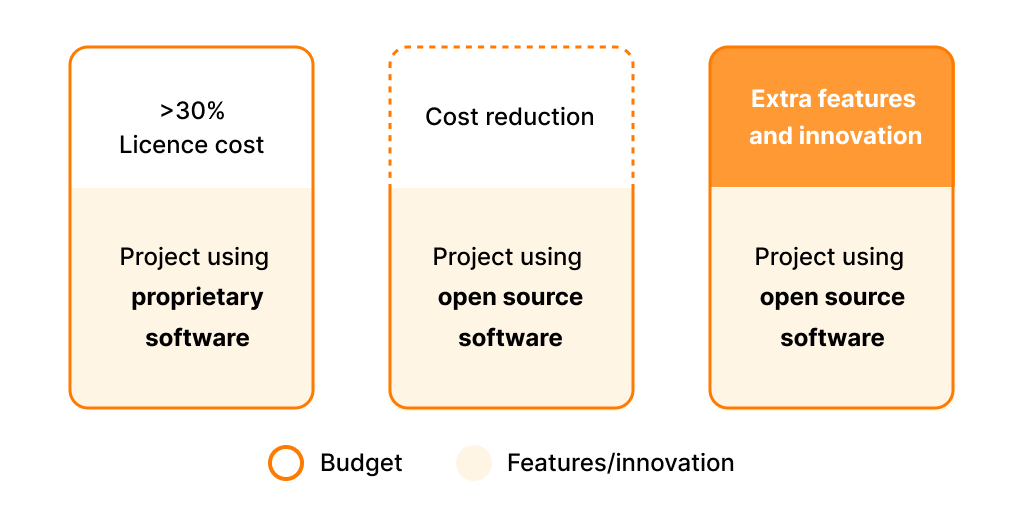Open-source software (OSS) has become a cornerstone for innovation and efficiency. Azure, Microsoft’s cloud computing platform, has embraced this trend by providing robust support for a variety of open-source technologies. We will explore how leveraging open-source opportunities on Azure can drive success for businesses, along with some compelling statistics from 2024 that highlight the impact and growth of this synergy.
With its many options and customization capabilities, and its cohesive infrastructure, Azure serves as the solution for many organizations’ ever-increasing needs. It is especially helpful for developers who want all the advantages of the cloud without giving up on the convenience and familiarity of open-source tools and their selected operating systems. Azure not only retains the ease and dependability of open-source tools, but it also improves them.
Key Statistics for Azure comparing performance over the last decade
The following statistics underscore the growing importance of open-source technologies on Azure in 2024:
Growth in Open-Source Adoption: Azure saw more than 50% of year-over-year increase in the deployment of open-source solutions, reflecting the rising confidence and reliance on OSS among enterprises.
Kubernetes on Azure: AKS adoption surged by 65%, driven by businesses seeking efficient and scalable container orchestration solutions.
Database Services: Azure Database for PostgreSQL and MySQL reported a 45% increase in usage, highlighting the preference for open-source database solutions.
Developer Engagement: Over 70% of Azure developers reported using open-source tools and frameworks, demonstrating the platform’s strong OSS integration.
Why Open Source?
Open-source software (OSS) has become a pivotal element in modern software development and deployment, offering numerous advantages that drive its widespread adoption. Here, we delve into the key benefits of using OSS:
1. Cost-Effectiveness
OSS is generally free to use, which can significantly reduce software costs.
- No Licensing Fees: One of the primary advantages of OSS is the absence of licensing fees. Unlike proprietary software, which often requires costly licenses, OSS can be downloaded, used, and modified without incurring these expenses.
- Reduced Total Cost of Ownership (TCO): By eliminating licensing fees, businesses can lower their overall software expenses. This includes not just the initial cost, but also ongoing costs associated with upgrades and maintenance.
- Lower Development Costs: OSS allows organizations to build on existing solutions rather than starting from scratch, thereby reducing development time and costs. This can be especially beneficial for startups and small businesses with limited budgets.

2. Flexibility and Freedom
With access to source code, businesses can customize software to meet their specific needs
- Customization: Access to the source code means that organizations can modify the software to tailor it to their unique requirements. This flexibility ensures that the software aligns perfectly with business processes and goals.
- Integration: OSS often provides better integration capabilities, as businesses can modify the code to ensure seamless interoperability with existing systems and applications.
- Control: Organizations retain full control over the software, including updates, security patches, and new feature implementations. This autonomy can be crucial for businesses with specific compliance or operational requirements.
3. Community Support
A vast community of developers constantly improves and supports open-source projects.
- Collaborative Development: Open-source projects benefit from the collective expertise of a global community of developers. This collaborative effort results in rapid development cycles and innovative features.
- Knowledge Sharing: The open-source community is known for its culture of sharing knowledge and resources. Forums, mailing lists, and online repositories are rich sources of information and support.
- Faster Problem Resolution: Issues and bugs are often identified and resolved more quickly in open-source projects due to the active involvement of the community. This leads to more stable and reliable software.
4. Security and Transparency
Open-source projects benefit from many eyes scrutinizing the code, often leading to quicker identification and resolution of security issues.
- Transparency: The open nature of OSS ensures that the code is available for inspection by anyone. This transparency means that security vulnerabilities can be identified and addressed promptly.
- Rapid Patching: With a large community monitoring the code, security patches and updates are developed and released quickly. This reduces the window of vulnerability and enhances overall security.
- Trust: Transparency fosters trust, as users can verify the security and integrity of the software themselves, rather than relying solely on the vendor’s assurances.
5. Additional Benefits
Innovation and Agility:
- Continuous Improvement: OSS often evolves faster than proprietary software due to its open development model. New features and enhancements are frequently introduced, keeping the software at the cutting edge.
- Experimentation: Developers can experiment with and adapt OSS without restrictive licensing agreements. This freedom encourages innovation and the exploration of new ideas.
Interoperability:
- Standards Compliance: Many OSS projects adhere to open standards, ensuring compatibility and interoperability with other software and systems. This reduces vendor lock-in and facilitates smoother integration across different platforms.
Community and Ecosystem:
- Vibrant Ecosystem: OSS fosters a vibrant ecosystem of contributors, users, and organizations that collaborate and support each other. This ecosystem can provide valuable networking opportunities and partnerships.
By leveraging OSS, businesses can achieve greater flexibility, security, and community support, positioning themselves for success in today’s competitive and dynamic technological landscape.
Azure’s Commitment to Open Source
Azure has made significant strides in integrating open-source technologies into its ecosystem. Microsoft’s shift towards embracing OSS is evident in various initiatives and services offered on Azure:
Azure Kubernetes Service (AKS): AKS is a fully managed Kubernetes service that simplifies deploying, managing, and scaling containerized applications using open-source Kubernetes.
Azure DevOps: Supports a variety of open-source tools and frameworks, enabling seamless integration and continuous delivery pipelines.
Azure Database for Open Source: Fully managed databases for PostgreSQL, MySQL, and MariaDB, offering high availability, scalability, and security.
Azure Functions: Supports multiple programming languages, including Python, Java, and Node.js, all of which are popular in the open-source community.
Open-Source SDKs and APIs: Azure provides SDKs and APIs in various open-source languages, allowing developers to build and deploy applications with ease.
Best Practices for Leveraging Open-Source on Azure
To maximize the benefits of open-source software (OSS) on Azure, it’s crucial to follow best practices that ensure efficiency, compliance, and security. Azure consulting can help businesses streamline the adoption of OSS, ensuring optimal performance and scalability. Here’s a closer look at some essential strategies:
Understand Licensing and Compliance
Ensure you are aware of the licensing requirements and compliance implications of using OSS.
- Research Licenses: Different open-source licenses have various terms and conditions. Understand whether the software is permissive or restrictive.
- Compliance Checks: Regularly audit your use of open-source software to ensure compliance with the respective licenses.
- Legal Guidance: Engage with legal experts to navigate complex licensing issues and avoid potential legal pitfalls.
Leverage Azure Marketplace
Explore Azure Marketplace for a wide range of open-source solutions that can be easily deployed on Azure.
- Variety of Solutions: The Azure Marketplace offers an extensive catalog of open-source applications, tools, and frameworks.
- Ease of Deployment: These solutions are pre-configured and optimized for Azure, making deployment straightforward and efficient.
- Scalability: Choose solutions that can scale with your business needs, ensuring performance and reliability as demand grows.
Engage with the Community
Participate in open-source communities and contribute to projects. This can provide valuable insights and help resolve issues more quickly.
- Join Forums and Groups: Participate in forums, mailing lists, and community groups related to your open-source tools.
- Contribute Code: Contributing to open-source projects can enhance your understanding and foster valuable connections.
- Stay Updated: Keep abreast of the latest developments and updates in the open-source community to leverage new features and improvements.
Optimize Costs
Use Azure Cost Management tools to monitor and optimize your expenditure on open-source services.
- Track Usage: Utilize Azure’s cost management tools to track your usage and spending on open-source services.
- Set Budgets and Alerts: Establish budgets and configure alerts to avoid unexpected costs.
- Cost Optimization: Regularly review and optimize your resource allocation to ensure you are getting the best value for your investment.
Implement Security Best Practices
Regularly update and patch your open-source software to mitigate security risks.
- Automate Updates: Use automated tools to ensure your open-source software is always up to date with the latest security patches.
- Vulnerability Scanning: Implement continuous vulnerability scanning to detect and address potential security threats.
- Security Policies: Develop and enforce security policies that include regular audits and compliance checks.
By adhering to these best practices, you can effectively leverage the power of open-source technologies on Azure, driving innovation, efficiency, and success for your business. As the 2024 statistics reveal, more organizations recognize the value of this powerful combination, driving increased adoption and success. By following best practices, utilizing Azure consulting services, and leveraging Azure’s extensive support for OSS, businesses can position themselves for sustained growth and technological advancement.










